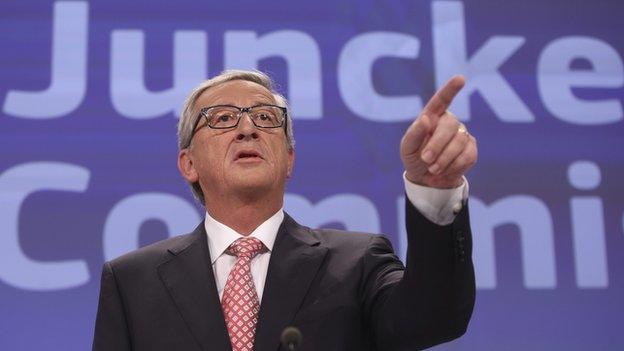MEPs back Juncker EU Commission team in key vote
- Published
Jean-Claude Juncker believes that flexibility is needed on all sides to deal with the problems the EU faces
MEPs have voted by a large majority in support of the new European Commission led by Jean-Claude Juncker.
The vote went 423 for, 209 against and there were 67 abstentions. It means the Commission can take office next month.
The commissioners underwent gruelling cross-examination at individual hearings in the European Parliament.
Mr Juncker reshuffled some appointments after objections from MEPs. The Commission drafts EU laws, oversees national budgets and enforces EU rules.
Nine UK Conservatives abstained from the vote, but six voted for and three were against.
Hardline Eurosceptics, including the UK Independence Party, opposed the Commission, as did the Greens and leftists. But the main party blocs voted for the new team.
The 28-strong team has one official from each EU nation.
Speaking before the vote, external, Mr Juncker said it was "pathetic" that he had been unable to appoint more than nine women to the Commission, despite having urged national governments to put forward more women. MEPs applauded him for making that point.
He asked MEPs to lobby their national parties to raise awareness about gender equality.
For many years he was prime minister of Luxembourg and is a veteran of EU integration efforts.
"I'm a bit embarrassed about this because Luxembourg didn't appoint a woman," he said, adding in English: "in the short term I won't be able to change my sex".
Nigel Farage, UKIP, speaking ahead of the vote: "We will be voting against the Commission... because it is anti-democratic"
New structure
Mr Juncker is from the main centre-right bloc, the European People's Party (EPP), which won the May European elections.
He has created the new post of first vice-president, appointing Frans Timmermans from the Netherlands, another EU veteran, with whom he has worked for many years.
One of Mr Timmermans's key tasks is to look at the question of subsidiarity - that is, issues that can best be addressed at national rather than pan-European level.
The UK and some other countries have urged the Commission to cut red tape and devolve more power to national governments.
Mr Timmermans will also be responsible for sustainable development - something that MEPs had demanded during the hearings.
Other vice-presidents will oversee some other key areas, external, such as the EU budget, jobs and growth, and energy.
The UK's Lord Hill will be commissioner for financial services, overseeing banking - a post welcomed by the UK government. However, he had a rough ride in the hearings, as MEPs recalled him for a second round of questioning.
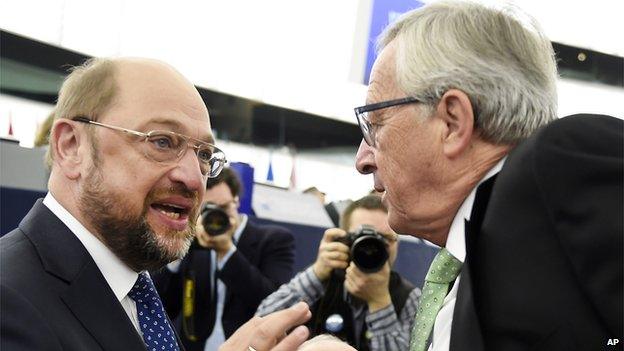
Parliament President Martin Schulz (left) leads the centre-left - the second-largest MEP bloc

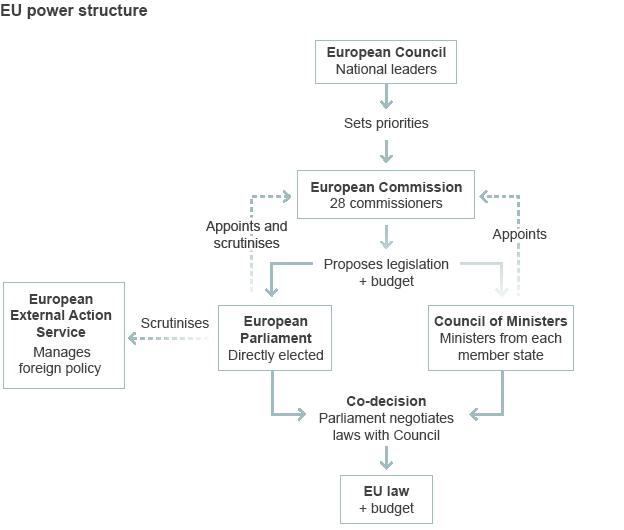

More overlap
Mr Juncker told MEPs that he would present a 300bn-euro (£237bn; $380bn) investment package to boost jobs and growth by Christmas.
He regretted that only two eurozone countries had retained triple-A credit ratings - Germany and Luxembourg.
"I'd like the EU to equip itself with a social triple-A rating - that's just as important as an economic and financial triple-A," he said.
He also vowed to break down "silos" in the Commission, to end "commissioners working in their corner behind closed doors, which is a rather provincial approach".
"The big loser of this new structure is me. I have delegated a lot of my presidential powers to the vice-presidents," he said.
Under pressure from MEPs Mr Juncker nominated a different candidate from Slovenia - Violeta Bulc - to the post of transport commissioner. Slovenia's ex-PM Alenka Bratusek was the only candidate to be rejected by MEPs.
He also named Slovakia's Maros Sefcovic as vice-president responsible for energy union, in another concession to MEPs.
Greens leader Rebecca Harms said her group voted against, external because the new Commission was not prioritising environmental action. The Greens also opposed two nominees - Spain's Miguel Arias Canete (energy) and Hungary's Tibor Navracsics (education and culture), she said.

Structure of the European Commission
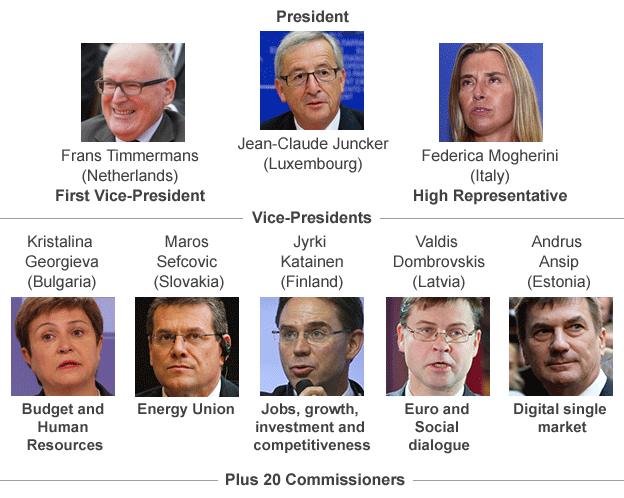
Vytenis Andriukaitis (Lithuania) Health and food safety
Miguel Arias Canete (Spain) Climate action and energy
Dimitris Avramopoulos (Greece) Migration and home affairs, citizenship
Elzbieta Bienkowska (Poland) Internal market, industry, entrepreneurship and SMEs (small and medium-sized businesses), space projects
Corina Cretu (Romania) Regional policy
Johannes Hahn (Austria) European neighbourhood policy and enlargement negotiations
Jonathan Hill (UK) Financial stability, financial services and capital markets union
Phil Hogan (Ireland) Agriculture and rural development
Vera Jourova (Czech Republic) Justice, consumers and gender equality
Cecilia Malmstroem (Sweden) Trade
Neven Mimica (Croatia) International co-operation and development
Carlos Moedas (Portugal) Research, science and innovation
Pierre Moscovici (France) Economic and financial affairs, taxation and customs
Tibor Navracsics (Hungary) Education, culture, youth and sport
Guenther Oettinger (Germany) Digital economy and society
Violeta Bulc (Slovenia) Transport
Christos Stylianides (Cyprus) Humanitarian aid and crisis management
Marianne Thyssen (Belgium) Employment, social affairs, skills and labour mobility
Karmenu Vella (Malta) Environment, maritime affairs and fisheries
Margrethe Vestager (Denmark) Competition

- Published22 October 2014
- Published8 October 2014
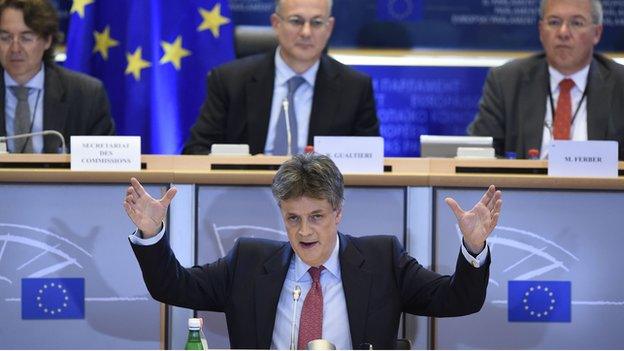
- Published10 September 2014
